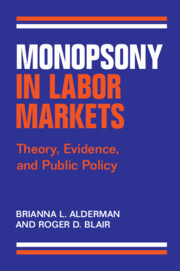Refine search
Actions for selected content:
68 results
10 - A Neo-Kantian Approach to Competition Law?
-
-
- Book:
- Toward an Inframarginal Revolution
- Published online:
- 26 September 2025
- Print publication:
- 16 October 2025, pp 355-408
-
- Chapter
- Export citation
3 - The Progressive Case against Antimonopolism
-
-
- Book:
- Toward an Inframarginal Revolution
- Published online:
- 26 September 2025
- Print publication:
- 16 October 2025, pp 45-99
-
- Chapter
- Export citation
2 - A New Corporate Tax
-
-
- Book:
- Toward an Inframarginal Revolution
- Published online:
- 26 September 2025
- Print publication:
- 16 October 2025, pp 31-44
-
- Chapter
- Export citation
14 - Hipster Antiplagiarism
-
-
- Book:
- Toward an Inframarginal Revolution
- Published online:
- 26 September 2025
- Print publication:
- 16 October 2025, pp 492-514
-
- Chapter
- Export citation
8 - Some Ways Forward
-
- Book:
- Killing the Messenger
- Published online:
- 05 September 2025
- Print publication:
- 25 September 2025, pp 164-190
-
- Chapter
-
- You have access
- Open access
- HTML
- Export citation
19 - Redefining Rivalry
- from Part III - Generative AI
-
-
- Book:
- The Cambridge Handbook of Generative AI and the Law
- Published online:
- 08 August 2025
- Print publication:
- 07 August 2025, pp 317-346
-
- Chapter
- Export citation
7 - Antitrust
- from Part III - Regulation And Functional Law
-
- Book:
- Ending Income Inequality
- Published online:
- 09 June 2025
- Print publication:
- 26 June 2025, pp 174-208
-
- Chapter
- Export citation
Partisan preferences for antitrust policy
-
- Journal:
- Political Science Research and Methods , First View
- Published online by Cambridge University Press:
- 16 June 2025, pp. 1-11
-
- Article
-
- You have access
- Open access
- HTML
- Export citation
Responsive competition law
-
- Journal:
- European Law Open / Volume 3 / Issue 4 / December 2024
- Published online by Cambridge University Press:
- 31 March 2025, pp. 768-793
-
- Article
-
- You have access
- Open access
- HTML
- Export citation
The Insiders’ Dilemma: An Experiment on Merger Formation
-
- Journal:
- Experimental Economics / Volume 8 / Issue 3 / September 2005
- Published online by Cambridge University Press:
- 14 March 2025, pp. 267-284
-
- Article
- Export citation
International economic relations and American support for antitrust policy
-
- Journal:
- Business and Politics / Volume 27 / Issue 2 / June 2025
- Published online by Cambridge University Press:
- 24 January 2025, pp. 159-179
-
- Article
-
- You have access
- Open access
- HTML
- Export citation
Antitrust and corporate taxation
-
- Journal:
- Business and Politics / Volume 27 / Issue 3 / September 2025
- Published online by Cambridge University Press:
- 17 January 2025, pp. 350-371
-
- Article
-
- You have access
- Open access
- HTML
- Export citation
Celebrating 70 Years of Health Law at BU
-
- Journal:
- American Journal of Law & Medicine / Volume 50 / Issue 3-4 / December 2024
- Published online by Cambridge University Press:
- 24 March 2025, pp. 149-160
- Print publication:
- December 2024
-
- Article
-
- You have access
- Open access
- HTML
- Export citation
Is Communications-Company Ownership of Video Content a Threat to Competition?
-
- Journal:
- Journal of Benefit-Cost Analysis / Volume 16 / Issue S1 / Spring 2025
- Published online by Cambridge University Press:
- 25 November 2024, pp. 84-95
-
- Article
-
- You have access
- Open access
- HTML
- Export citation
4 - Antitrust Policy in the United States
-
- Book:
- Monopsony in Labor Markets
- Published online:
- 08 February 2024
- Print publication:
- 15 February 2024, pp 50-61
-
- Chapter
- Export citation
11 - Closing Thoughts
-
- Book:
- Monopsony in Labor Markets
- Published online:
- 08 February 2024
- Print publication:
- 15 February 2024, pp 181-186
-
- Chapter
- Export citation
1 - Monopsony in the Labor Market
-
- Book:
- Monopsony in Labor Markets
- Published online:
- 08 February 2024
- Print publication:
- 15 February 2024, pp 1-14
-
- Chapter
- Export citation

Monopsony in Labor Markets
- Theory, Evidence, and Public Policy
-
- Published online:
- 08 February 2024
- Print publication:
- 15 February 2024
1 - Restoring and Revitalizing Technology Markets for Mobile Wireless
- from Part I - Intellectual Property and Competition Policy in Global Wireless Markets
-
-
- Book:
- 5G and Beyond
- Published online:
- 14 December 2023
- Print publication:
- 21 December 2023, pp 3-32
-
- Chapter
-
- You have access
- Open access
- HTML
- Export citation
11 - Patents and Competition
- from Part V - Patent Enforcement, Wireless Markets, and Global Competitiveness
-
-
- Book:
- 5G and Beyond
- Published online:
- 14 December 2023
- Print publication:
- 21 December 2023, pp 242-262
-
- Chapter
-
- You have access
- Open access
- HTML
- Export citation
